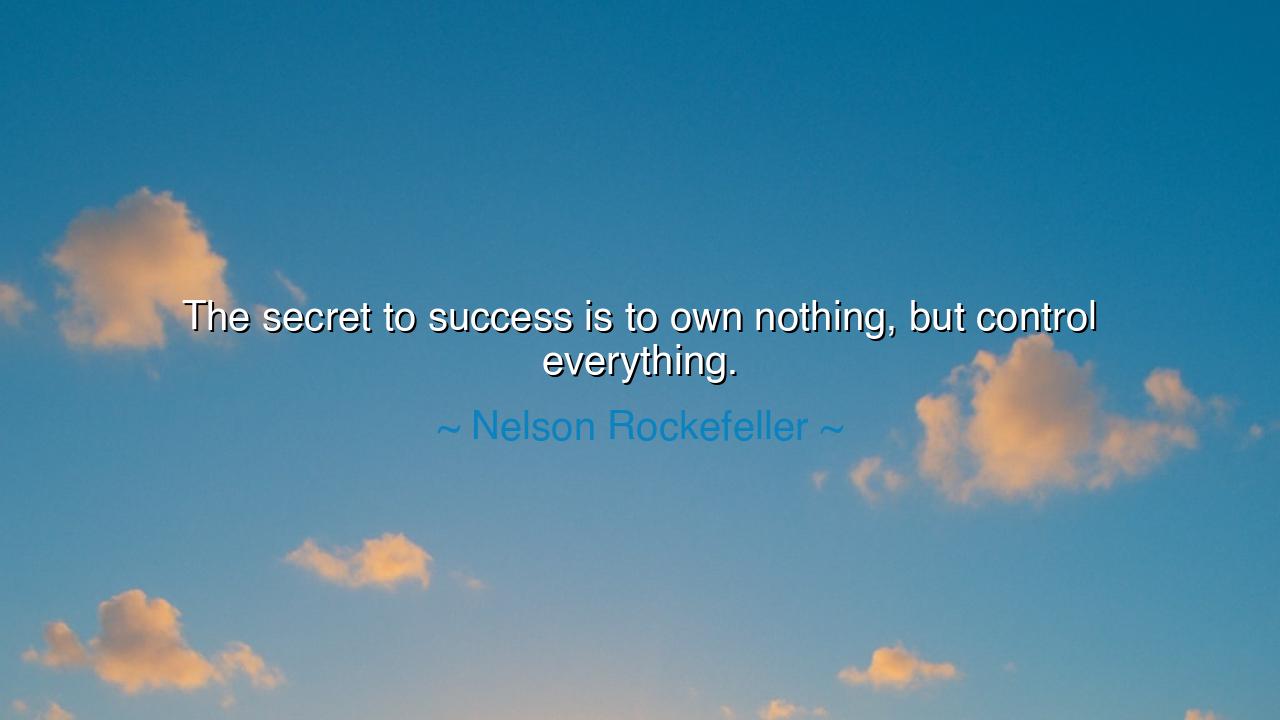
The secret to success is to own nothing, but control everything.






“The secret to success is to own nothing, but control everything.” Thus spoke Nelson Rockefeller, heir of power and architect of influence. His words, though clothed in the garments of business, resound with the weight of ancient strategy. For he teaches not merely of wealth, but of mastery—the art of directing the flow of power without chaining oneself to possession. To own is to be burdened; to control is to be free, flexible, and sovereign.
The ancients long understood this wisdom. The general who seeks to own every city he conquers soon finds himself exhausted, his armies stretched, his coffers empty. But the general who learns to control without ownership—through alliances, through loyalty, through influence—commands far greater power. He holds sway not by grasping tightly, but by guiding subtly. Rockefeller, whose family empire spanned oil, finance, and politics, understood that true success is not found in possession, but in the unseen hand that shapes outcomes.
Consider the empires of history. The British, in their age of dominion, rarely sought to own every inch of land. Instead, they mastered the art of influence, placing governors, forging trade routes, and securing the loyalty of local rulers. The empire stretched across seas not because of endless ownership, but because of strategic control. It was a web, not a fortress, and it endured because its strength lay not in what it carried, but in what it directed.
In Rockefeller’s own life, this truth was revealed through his dealings. He built structures of corporations and trusts where he, personally, owned little in his own name, yet the reach of his hand extended into every corner of industry. To “own nothing” protected him from liability and risk; to “control everything” ensured that no decision escaped his influence. He was like the king who wears no crown, yet whose word shapes the destiny of nations.
The lesson is not only for empires and magnates. In the lives of common men and women, this wisdom still burns bright. To cling to ownership—of things, of titles, of status—is to shackle oneself. But to learn the art of control—of discipline over one’s mind, of mastery over one’s craft, of influence over one’s environment—is to wield power without burden. The man who owns nothing but controls his own habits, his own time, his own choices, is freer and richer than the man who fills his house with gold but cannot govern his desires.
O seekers of wisdom, understand this: possession is often an illusion of power, while control is its reality. Do not be deceived by appearances. Many own much yet are ruled by fear, debt, or vanity. But the one who governs quietly, who steers outcomes through patience and skill, wields the greater strength. For in this world, the true master is not the one seen with treasures in hand, but the one unseen, whose hand moves the treasures themselves.
In your life, practice this teaching. Do not be enslaved by the need to own everything. Instead, seek mastery of influence. Learn to build trust, to guide others, to place yourself where decisions are made. Govern your mind before you govern others. Shape systems rather than clinging to possessions. Then you shall find that, though your name may not be on the crown, the crown itself may bow to your will.
Thus let Nelson Rockefeller’s words endure: “Own nothing, but control everything.” It is the secret of kings and captains, of sages and strategists. For possessions fade, but mastery remains; ownership binds, but control liberates. Walk this path, and you shall taste the deeper meaning of success.






AAdministratorAdministrator
Welcome, honored guests. Please leave a comment, we will respond soon